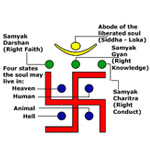

Every soul on this earth desires to develop it self and attain the highest state. But it remains in the midst of darkness as to how to achieve this goal.
To free the soul from all the cycles of birth and rebirth, and to attain complete salvation is what is called ‘Moksha’. It is attained when all the Karmas attached with our soul are removed. When a person repays the dues of all his this life and the past ones, then he attains salvation. In the state of Moksha the soul enjoys ultimate happiness and satisfaction. There; above the Sidha Sheela.
Out of the Nine Tatvas, moksha is the last because it can be attained after separating all the karmas attached with the soul. After reaching that highest state of purity of mind and soul, one can liberate himself fro this cycle of birth and rebirth. This is the ultimate state of development of soul – ‘Aatma’. According to Jainism moksha can be attained only by taking birth as a human – ‘Manav sharer dwara’. It also believes that to attain moksha is to attain ‘Lord almighty’.
If moksha can be attained through human body only then there might be some ways to be followed by humans to attain it.
Our Acharyas, Guru, Muni the tell us about the path to Moksha.
Methods :
There are three basic methods to attain ‘Moksha’
To achieve salvation or state of ultimate happiness, we have to free ourselves from all the karmas attached with our soul. And the method to get this is to understand the Tatvas very carefully and have complete believe in them. If we will believe in them we will try to follow them and free our self in the process.